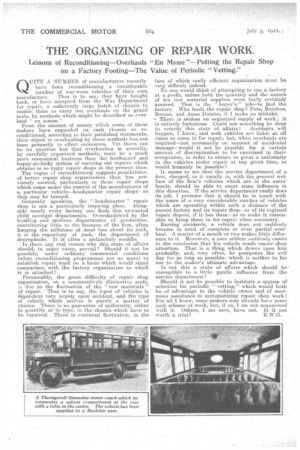THE ORGANIZING OF REPAIR WORK.
Page 26

If you've noticed an error in this article please click here to report it so we can fix it.
Lessons of Reconditioning—Overhauls "En Masse "--Putting the Repair Shop on a Factory Footing—The Value of Periodic "Vetting."
QUITE A NUMBER of manufacturers recently have been reconditioning a considerable number of war-worn vehicles of their own
manufacture. That is to say, they have bought back, or have accepted from the War Department for repair, a sufficiently large batch of chassis to enable them to carry out overhauls en the grand scale, by methods which might be described as overhaul " en moose."
From the amount of money which some, of these makers have expended on each chassis so reconditioned, according to their published statements, their object in overhauling by these methods has not been primarily to effect economies. Yet there can be no question but that overhauling in quantity, by carefully organized methods, must be a much more economical business than the haphazard and happy-go-lucky system of carrying out repairs which obtains in so many repair shops at the present tune. The vogue of reconditioning suggests possibilities. of better repair shop organization than has previously existed, particularly in those repair shops which come under the control of the manufacturer of a particular vehicle—headquarter repair shops—as they may be termed. Generally speaking, the " headquarter " repair shop is not a particularly inspiring place. Alongside nearly every factory one finds this unwanted child amongst departments. OvershadoWed by the bustling and spotless departments of production, contributing little to the finances of the firm, often. hanging the millstone of dead loss about its neck, it is the repository of junk, the department of decrepitude. It is often a melancholy muddle.
. Is there any real reason why this state of affairs should, in. many cases, prevail ? Should it not be possible, under ordinary commercial conditions (when reconditioning programmes are no more) to .establish repair work on a basis which would stand comparison with the factory organization to which it is attached?
Presumably, the great difficulty of repair shop organization, on a comparatively diminutive scale, is due to the fluctuation of the "raw materials" of repair. That is to say, the iepurt of vehicles is dependent very largely upon accident, and the type of vehicle which arrives is purely a matter of chance. There is no guarantee of uniformity, either in quantity or in type, in the chassis which have to be repaired. There is continual fluctuation, in the face of which really efficient organization must be very difficult indeed.
No one would think of attempting to run a factory at a profit, unless both the quantity and the nature of his raw material supplies were fairly certainly assured. That is the " buyer's " job—to find the factory. Who feeds the repair shop? Fate, Bacchus, Boreas, and .Anno Domini, if I make no mistake.
• There is seldom an •organized supply of work ; it is entirely fortuitous. Could not scanething be done to remedy this state of affairs? Accidents will happen, I know, and such vehicles are liable at all times to come in fm. repair, but, when overhauls are required—not necessarily on account of accidental damage—would it not be possible. for a certain 'amount of discrimination to be exercised in their acceptance, in order to ensure as great a uniformity in the vehicles under repair at any given time, as would humanly be possible?
It seems to me that the service department of a firm, charged, as it usually is, with the general welfare of the firm's vehicles which are in the users' hands, should be able to exert some influence in this direction. If the service department really does its job, I presume that it should be in touch with the users of a very considerable number of vehicles which are operating within such a distance of the parent factory and its repair shop—or of its regional repair depots, if it has them—as to make it reasonable to bring them in for repaie when necessary. Barring accidents, a vehicle does not suddenly become in need of complete or even partial overhaul. A matter of a month or two makes little difference to it. Moreover, a user seldom suddenly comes. to the conclusion that his vehicle needs repair shop attention. That is a thing which dawns upon him gradually, and, very often, he postpones the evil day for as long as possible—which is neither to his nor to the maker's ultimate advantage. Is not this a state of affairs which should be susceptible to a little gentle influence from the service department?
Should it not be possible to institute a system of selection for periodic " vetting," which would both be of advantage to the vehicle owner and of enormous assistance in systematizing repair shop work? For all I know, some makers may already have some such scheme at work, but, if so, I am net acquainted with it. Others, -I am sure, have not. Is it not worth a trial? R.W.G.
































